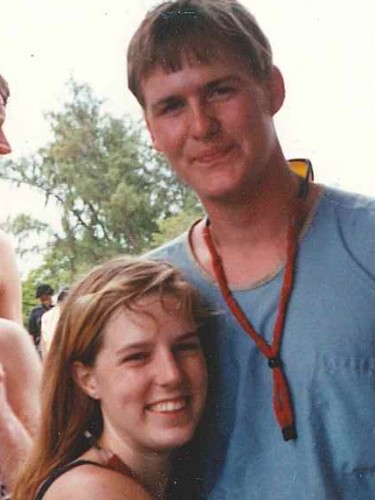A gift from the Israel Family of Auburn, Alabama, launches an endowment to honor the career of Dixon Myers, whose work has touched thousands.

Katherine Christy Israel, C'95, and Charles Israel, C'95, at Lime Cay on an outreach trip in the 1990s
Two words encapsulate the reason Charles Israel, C’95, and his wife, Katherine Christy Israel, C’95, chose to make a lead gift to establish a new outreach endowment in honor of Dixon Myers as he retires in 2021. "Dixon Rocks." Since their initial gift, over 100 people have made contributions to the fund, which now totals over $330,000.
The endowment will support the program generally, but in all likelihood will be expended on student support, as students themselves are normally responsible for about half the cost of attending an outreach trip. “What really drove it for us was thinking about who is prevented from having this experience?” says Katherine. “Can we help open the opportunity for more students?”
“Outreach was such a huge part of our Sewanee education, and we are trying to help out in what little way we can,” Charles adds.
For the past 30 years, through the leadership of Dixon Myers, Sewanee has led students on spring break service trips to Jamaica, Haiti, Costa Rica, Ecuador, and several U.S. cities. In addition, Myers founded Housing Sewanee, a Habitat for Humanity-style housing organization that builds affordable and efficient housing in the Sewanee area. And he has worked hard to ensure that Sewanee students have opportunities to pursue community service every day—not just on trips.
“Dixon was not just a one-week experience,” says Charles. “The breadth of his impact on students and the many communities he touched has been amazing.”
For the Israels, the spring break trip to Jamaica was both an opportunity to serve and an opportunity to receive a powerful education. “Dixon really tried to engage us in the learning process, to learn about the lives of the people we were encountering,” says Charles.
Katherine remembers clearly a touchstone moment, working in one of Mother Theresa’s homes for destitute women. “When we were there, we cooked, we cleaned, and then at one point our host handed me some sheets to sew and pointed me toward a sewing machine powered by a foot treadle. I did not know how to operate it. I realized in that moment that despite the world class education I was receiving at Sewanee, it was irrelevant to the world I was in at the moment.” For Katherine, that moment was an irreplaceable opportunity for perspective taking.
Perhaps one of the most important aspects of the Outreach Program Myers created is that it has always focused on building long term relationships with developing communities. The Israels went to Jamaica relatively early on in the history of the program, but it was already clear to them that they were inside a narrative that came before them and would last longer than their involvement. “Dixon already had a relationship with all the people we worked with in Jamaica,” says Charles. “We could have parachuted in, but because he had long running relationships meant that we were building on what had happened before. Our work meant more because it was a part of a focus on one place and was part of a community stretching before and after our particular interactions.”
Today, Charles is a history professor focusing on the history and religion of the American South and is associate dean of liberal arts at Auburn University. Katherine works with the Southeastern Center of Robotics Education, delivering robotics education to K-12 students and teachers. They have both brought much of Sewanee with them in their professional lives, and hope their gift can help others enjoy the same opportunities for education, experience, perspective that Dixon helped them have as Sewanee students.
Depending on the year and the outreach destinations, outreach trips cost from $100,000 to $150,000 per year to send from 85 to 110 students on trips at fall break, winter break, and spring break. This ambitious program has never had a university budget, and the number of students who can participate depends heavily on philanthropy. “About half of the cost is paid by the students themselves,” says Myers, “and the University Chaplain contributes about $30,000 per year. The rest is contributed by donors, and some donors have been supporting our work for many years. I’m happy that we might have the start of an outreach endowment to take the pressure off annual fundraising.”
To make a gift to the Dixon Myers Outreach Fund, follow this link or contact Scott Smith at wssmith@sewanee.edu. Gifts of $5,000 and greater will be directed toward a new endowment established by the Israel Family, and gifts of less than $5,000 will be directed toward a fund that supports current-year spending on outreach. “We are really hoping to have a robust response to Dixon’s retirement,” says Smith. “We are grateful to the Israels for launching the endowment and hope to add to the corpus for long term stability as well as meet short term needs from smaller gifts.”
Give now at this link: https://www.givecampus.com/3fbb08

